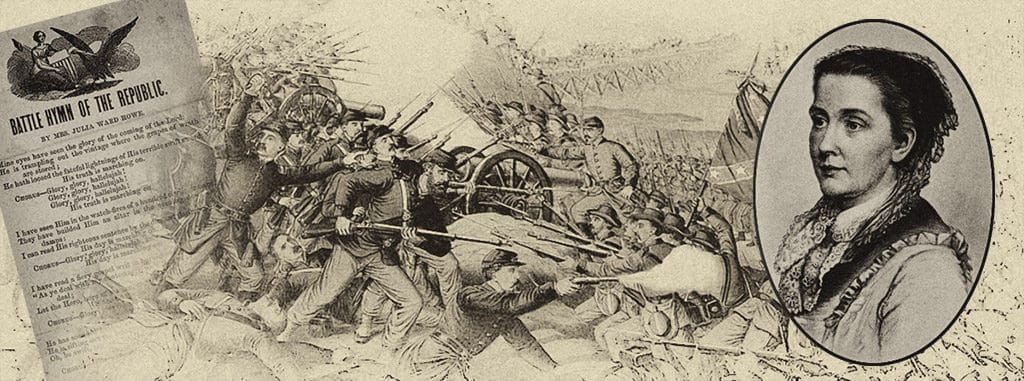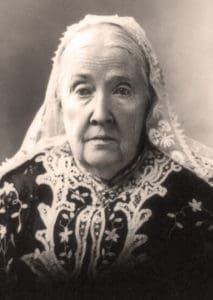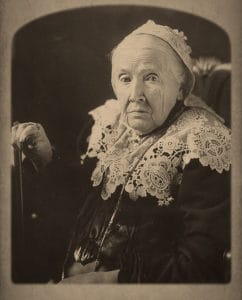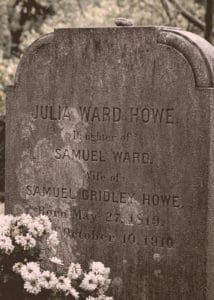
Little did Julia Ward Howe know that in writing what became the anthem of the American Civil War in 1861, she emancipated herself from the narrow, 19th-century views that kept women in domestic confinement, and realized her long-held ambition to become a thinker, a writer and an individual on her own terms.
It was while visiting Union camps and hospitals near Washington, DC, that Howe heard soldiers singing “John Brown’s Body.” When a friend suggested she write new lyrics for the slightly gruesome old tune, she initially pooh-poohed the idea.
Civil War lyrics
But that night, while staying at the Willard Hotel, the words came to her: “Mine eyes have seen the glory …”
Born in New York in 1819, Julia Ward was an intelligent, inquisitive child with a sharp mind and a keen wit. In an age when women had limited educational opportunities, Ward was self-educated thanks to the extensive library her brother shipped home from Europe during his travels.
[perfectpullquote align=”right” color=”#663300″]”I never could be good when I was not happy.”[/perfectpullquote]She married Dr. Samuel Gridley Howe in 1843. Eighteen years her senior with what his wife characterized as “tyrannical instincts,” he frowned on Julia’s literary leanings and her work for women’s organizations. He expected her to be completely fulfilled in her role as wife and mother and graciously accept his word as law. But Julia saw things very differently, once asking her sister, “In giving life to others, do we lose our own vitality and sink into dimness, nothingness and living death?”
Turbulent marriage
It was a difficult and, at times, turbulent marriage. The couple considered divorce; but when Howe demanded that he keep two of their six children, his threat was more than Julia could bear. She confided to her diary, “I have never known my husband to approve any act of mine which I myself valued.”

It seems his disapproval even extended to matters of childbirth. While laboring to deliver one of their children, Howe asked to be given ether. Her husband forbade it, claiming women needed discipline, and that the pain of labor and childbirth was meant to lead women “back to lives of temperance, exercise and reason.”
In 1850 the couple traveled to Rome, where Julia Ward Howe spent the winter with her sisters and two youngest children after her husband returned to Boston.
When she returned, Howe defied her husband’s wishes by publishing a collection of her poems — albeit anonymously.
Intimate details
“Passion Flowers,” though not particularly well received, was sensational in that the poems contained intimate personal details that revealed the inner workings of a difficult marriage — what one reader described as “a whole history of domestic unhappiness.” Needless to say, Dr. Howe was furious at what he perceived as wifely disobedience and outright betrayal. Julia wrote to her sister, “I really thought he would have driven me to insanity, so horribly did he behave.”
[perfectpullquote align=”right” color=”#663300″]”Life is like a cup of tea – the sugar is all at the bottom.”[/perfectpullquote]When her most famous poem, the “Battle Hymn of the Republic,” was published under her name in 1861, Julia Ward Howe became an instant celebrity. By then, her husband’s fierce resistance to his wife’s work had become what some called “amused admiration,” as their marriage settled into a workable arrangement. Before he died in 1876, after 33 years of marriage, Samuel Gridley Howe saw the woman he kept under his thumb for so many years blossom to become one of the most celebrated women in America — a preacher, philosopher, reformer and poet.
Julia Ward Howe once said, “Marriage, like death, is a debt we owe to nature.” So perhaps it’s not surprising that her first diary entry after her husbands funeral was, “Began my new life today.” For the next 40 years she was a formidable force, traveling the world to promote women’s rights, world peace, and prison and educational reform. Her letters and diaries are a veritable who’s-who of the 19th century — Oscar Wilde, Ralph Waldo Emerson, Walt Whitman and Samuel Clemens were among her friends and acquaintances.

Lecture circuit
At the turn of the century, Howe was a familiar figure on the lecture circuit — a tiny, bespectacled figure in a lace cap and shawl from another era who seemed, to some, “the repository of a vanished age.” She died in Portsmouth, Rhode Island, in 1910, at age 91, venerated as “the dearest old lady in America.”
So many people wanted to attend her funeral that two services had to be held — one at the Church of the Disciples and another at Boston Symphony Hall. She was laid to rest in Boston’s historic Mount Auburn Cemetery.
Songwriters Hall of Fame
Two years prior to her death, Howe became the first woman elected to the American Academy of Arts and Letters; sixty-two years later, in 1970, she was inducted posthumously into the Songwriters Hall of Fame. In 1986 the US Postal Service honored Julia Ward Howe with a 14¢ stamp as part of their Great Americans Series. Her home in Rhode Island was added to the National Register of Historic Places in 1978, and her Boston home is a stop on the Boston Women’s Heritage Trail.

But her greatest legacy is the song that stirred a nation — the Battle Hymn of the Republic remains one of the most enduring works of art of the Civil War years. The song was one of Winston Churchill’s favorite hymns, and was played at his funeral in St. Paul’s Cathedral in 1965. Walt Disney loved it so much it was played at the conclusion of his private funeral in 1966. And in his final sermon, “I’ve Been to the Mountaintop,” in Memphis, just one night before his assassination, Martin Luther King, Jr.’s last public words closed with the first line of Howe’s battle hymn: “Mine eyes have seen the glory of the coming of the Lord.”
~ ~ ~
LYRICS: BATTLE HYMN OF THE REPUBLIC
Mine eyes have seen the glory of the coming of the Lord;
He is trampling out the vintage where the grapes of wrath are stored;
He hath loosed the fateful lightning of His terrible swift sword;
His truth is marching on.
Glory! Glory! Hallelujah!
Glory! Glory! Hallelujah!
Glory! Glory! Hallelujah!
His truth is marching on.
I have seen Him in the watch-fires of a hundred circling camps;
They have builded Him an altar in the evening dews and damps;
I can read His righteous sentence by the dim and flaring lamps,
His day is marching on.
I have read His fiery gospel writ in rows of burnished steel!
“As ye deal with my condemners, so with you My grace shall deal!
Let the Hero, born of woman, crush the serpent with his heel, “
Since God is marching on.
He has sounded forth the trumpet that shall never call retreat;
He is sifting out the hearts of men before His judgment seat;
Oh, be swift, my soul, to answer Him; be jubilant, my feet!
Our God is marching on.
In the beauty of the lilies Christ was born across the sea,
With a glory in His bosom that transfigures you and me;
As He died to make men holy, let us die to make men free!
While God is marching on.
